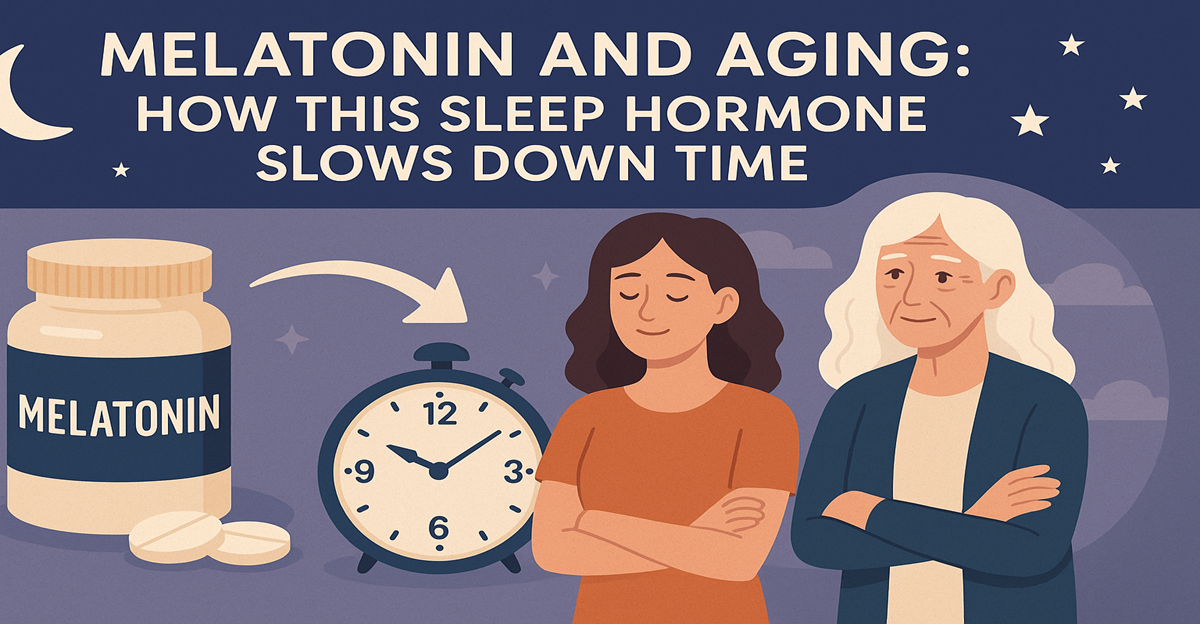You’ve Probably Heard About Melatonin But Did You Know…
Melatonin is one of those cool hormones that plays a central role in how we sleep and feel. Known affectionately as the ‘sleep hormone’, melatonin’s main gig is to regulate our sleep-wake cycles. When daylight fades, and the night settles in, melatonin production kicks into gear, orchestrating the body’s rhythm to get us ready for rest.
We already know that sleep has the benefit of slowing down aging as shown in the article The Connection Between Sleep And Anti-Aging but we can also acknowledge the benefits of some of the natural substances that help us with getting a good night’s rest with Melatonin being one of the main natural supplements to help us to do so.
Most of the melatonin in our bodies gets produced in the pineal gland. Imagine this tiny gland—a little more than a pea in size—tucked away in the middle of the brain, acting like a natural timekeeper. By releasing melatonin in response to darkness, it helps synchronize various bodily systems with the day-night cycle, keeping us tuned to our environment.
Age, lifestyle, and the environment can all mess with our melatonin levels. Bright lights late at night, excessive screen time, and irregular sleep patterns can all dim production. As we age, our bodies naturally produce less melatonin, which can lead to sleep problems. Understanding these factors can help us fine-tune our routines for better rest.
Cranking up the melatonin involves more than just ditching your phone at night. It’s about creating an environment that mimics natural darkness, practicing good sleep hygiene, and maybe rethinking that late-night cup of coffee. Combining these practices with knowledge about how melatonin works can empower anyone to tweak their routines for better sleep and healthier living.
Delving deeper into melatonin, even though I’d said I wouldn’t use those words, sheds light on how vital this hormone is not only for a good night’s sleep but for overall wellbeing. Embracing this knowledge can arm us with the tools to combat the challenges of modern living.
The Science of Aging: Can Time be Slowed Down?
Aging is one of those things we all face, with subtle changes creeping in over time. You know the deal – more laugh lines, less bounce in your step. Biologically speaking, it’s a complex process, a gradual decline caused by cellular and molecular changes that build up over the years.
Folks have long been on a quest to find ways to slow down this biological clock. Gerontologists and researchers are constantly exploring theories and treatments that could tweak aging at its core, aiming to add life to years, not just years to life. Though the fountain of youth remains elusive, understanding the science behind aging helps us make informed choices.
Among these efforts, melatonin stands out as a potential ally. Emerging studies suggest that this sleep hormone might do more than just ensure you sleep soundly. By acting on key pathways involved in aging, melatonin might slow certain aging processes, offering promise in the fields of longevity and healthspan enhancement. It’s like discovering a secret agent in our bodies working on anti-aging from the inside out.
Relying on science’s latest cues, we’re beginning to see how maintaining healthy melatonin levels could support life’s later chapters. Scientists are studying how melatonin could impact things like oxidative stress, inflammation, and cellular renewal.
Staying on top of these scientific advances provides a roadmap for incorporating everyday practices that align with longevity goals. While there’s no magic bullet for stopping the aging process, being aware of such insights helps in taking meaningful steps toward a brighter, more energetic future.
Melatonin’s Role in Sleep and Circadian Rhythms
Our bodies love a good rhythm, especially when it comes to sleep. Melatonin’s key job is to manage this rhythm, syncing up our internal clock with the outside world. It’s a hands-on manager of our circadian rhythm, which acts like our body’s natural sleep-wake cycle, adjusting to light and dark cues in the environment.
When melatonin steps up to bat, it signals the body that it’s time to wind down. As night falls and darkness looms, melatonin levels rise, leading us into that dreamy state of restful slumber. Think of it as nature’s way of setting a bedtime that helps maintain a consistent sleep pattern.
Melatonin not only makes snooze time more restful but healthier, too. Quality, uninterrupted sleep supports everything from mood regulation to immune function and cognitive performance. In modern life, though, sleep quality takes a beating thanks to stress, erratic schedules, and that notorious blue light from screens.
Research shows that melatonin supplementation can be a game-changer for folks struggling with sleep disorders. Insomniacs, for instance, might find a melatonin boost helps weave back a healthier sleep tapestry. It also aids those with circadian rhythm sleep disorders, including jet lag and shift work sleep disorder.
Ensuring good melatonin levels naturally involves practices like reducing screen time before bed, establishing a consistent sleep schedule, and keeping the sleep environment cool and dark. Pairing knowledge of melatonin’s influence on sleep with these healthy habits can help transform the way we rest.
Grasping melatonin’s role in maintaining our sleep patterns taps into bigger ideas of wellness and productivity. A balanced sleep schedule harmonized by melatonin paves the way not only for better sleep but for improved daytime energy and overall health.
Melatonin and Aging: What Science Says
As we navigate through life, it’s clear aging isn’t just about gathering birthdays. It’s an intricate dance of cellular changes and system slowdowns. One thing that takes a hit over time is our body’s production of melatonin. With age, melatonin levels drop, and this decline is more than just an inconvenience—it can impact many facets of health.
Researchers are digging into the potential links between melatonin and aging, unraveling a fascinating web of connections. For instance, melatonin is a noted antioxidant, battling oxidative stress, which is a major contributor to cellular aging. Studies suggest that this hormone might even help in reducing inflammation, another thorn in aging’s side.
Scientific investigations are painting an intriguing picture of melatonin as a guardian against certain age-related conditions. Some research points to its protective role in cognitive decline, promoting brain health and even potentially delaying neurodegenerative diseases like Alzheimer’s.
But melatonin’s age-defying reputation doesn’t stop at the brain. It’s also been examined for its potential role in bolstering heart health and supporting metabolic functions. Researchers are still piecing together the full spectrum of its benefits, tabulating how melatonin might hold some keys to healthier aging.
Leveraging melatonin as part of an aging strategy involves more than popping a supplement. Staying informed about ongoing research and understanding how it fits into the broader health landscape is crucial. While scientists are still unraveling its full potential, maintaining a lifestyle that supports natural melatonin production could offer some of the same benefits.
Engaging with this research and taking steps to support natural melatonin levels could pave the way for not only adding years to life but also for enhancing life within those years. It’s about taking what science offers and weaving it into a narrative of healthy, vibrant aging.
Practical Tips for Enhancing Melatonin Levels Naturally
Tuning into the body’s natural rhythm can work wonders for melatonin production. Making simple lifestyle adjustments can help ramp up your natural melatonin levels and improve sleep quality. And the good news is, these changes are pretty straightforward.
One of the easiest tweaks is to dim the lights as bedtime approaches. Reducing exposure to artificial light, especially that pesky blue light from screens, lets melatonin do its thing without interruption. Setting tech boundaries can also aid in maintaining your body’s sleep schedule.
Diet plays a surprising role in melatonin levels too. Incorporating foods rich in melatonin, such as cherries, walnuts, and bananas, could give a gentle boost. A balanced diet that includes these natural goodies helps in creating a conducive environment for melatonin production.
Sticking to a regular sleep schedule is another helpful strategy. Giving your body consistent sleep and wake times helps regulate melatonin output, syncing it with your circadian rhythm. Creating a serene sleep environment can also support melatonin’s natural flow. A cool, dark, and quiet bedroom encourages better rest.
Lastly, engaging in regular physical activity during the day can have a positive impact on sleep quality, though it’s best to avoid vigorous exercise close to bedtime. Daylight exposure, especially in the morning, also helps reinforce your internal biological clock.
These small but effective habits can help keep your melatonin levels in check, setting the stage for better sleep and overall health. By embracing these practices, you’re empowering your body’s natural ability to produce melatonin, enabling better rhythm and rest.
Melatonin, Health, and Future Technologies
Exploring the future of melatonin enhancement takes us into the realm of emerging technologies and health innovations. Scientists and tech-savvy pioneers are constantly shaping new methods to boost natural melatonin production or mimic its effects, aiming for improved sleep and well-being.
Innovative supplements and smart gadgets are on the rise, focusing on optimizing melatonin levels for better rest. From wearable tech that monitors sleep patterns and suggests optimal sleep times, to novel supplement formulations that enhance melatonin absorption, the options keep expanding. Some are even experimenting with adaptive lighting solutions that adjust to mimic natural day-night cycles, supporting melatonin regulation.
Beyond sleep, researchers are delving into potential health benefits of melatonin in the realms of immunity and chronic disease management. Initial findings indicate promising uses, though thorough studies are needed to validate these claims comprehensively. For more about melatonin go here to an article about six long term benefits of using melatonin.
Considering these forward-thinking approaches, it’s essential to weigh the ethical considerations and long-term safety of melatonin-related technologies. Understanding their potential impact on natural biological processes is crucial. While tech offers exciting possibilities, maintaining balance with natural methods remains important.
Engaging with such technologies requires an informed approach. Staying updated with ongoing research and consulting with healthcare professionals can guide better decision-making when incorporating these tech-enhanced solutions into your lifestyle.
As we look ahead, the intersection of melatonin and technology holds promise not only for improving sleep but also for contributing to broader health goals. Staying informed and thoughtfully exploring these advancements can provide effective ways to harness melatonin’s full potential in modern health journeys.
Conclusion:
There are other natural solutions for sleep and some of these such as L-Tryptophan, Ashwagandha, and Magnesium Glycinate work harmoniously to regulate your sleep cycle, relax your body, and calm your mind. The inclusion of Valerian Root Extract, GABA, and of course Melatonin to support deep, restorative sleep. These plus a few other all-natural ingredients are presented in a product called Sleep Tonight by GreatLife Worldwide. To find out more go to the product section of https://greatlifeworldwide.com/ref/keithstieneke/9 and scroll down and click on sleep.

